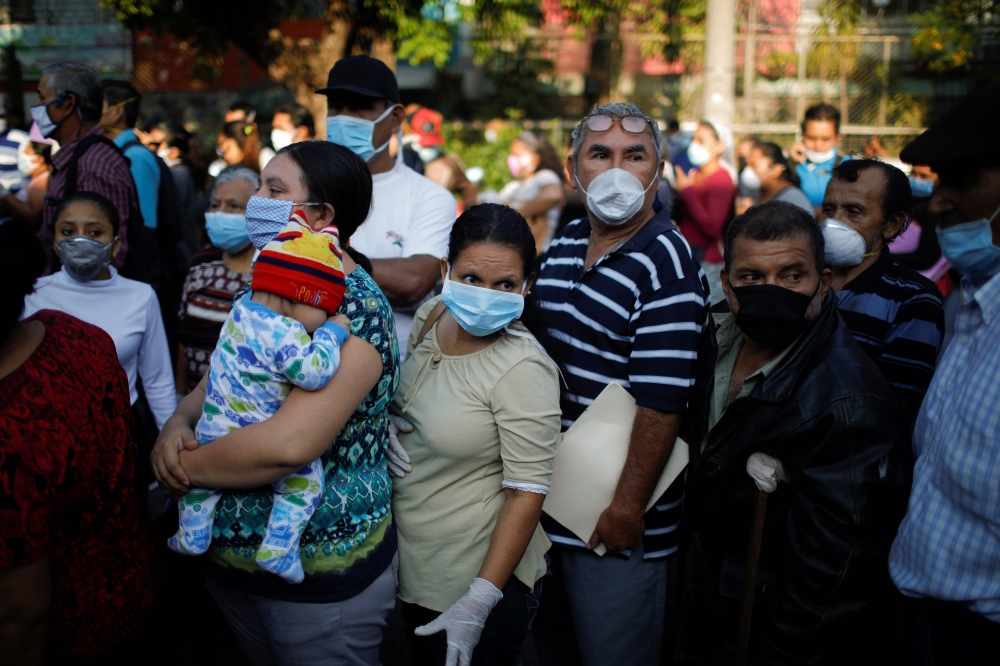Barcelona, Spain
Thomson Reuters Foundation
The COVID-19 pandemic threatens to hit the world’s poorest nations disproportionately, the United Nations has warned, not just as a health crisis but as a social and economic crisis for billions of people in the months and years to come.
The disease will likely overwhelm under-resourced hospitals and fragile health systems, especially if cases spike in the poorest nations where three-quarters of people lack access to soap and water, the UN Development Programme said.

People wait outside the National Center for Care and Administration of Subsidies (CENADE) to find out if they are eligible for the economic aid announced by El Salvador’s President, Nayib Bukele, for people who cannot work due to the mandatory quarantine as the government undertakes steadily stricter measures to prevent a possible spread of the coronavirus disease (COVID-19), in San Salvador, El Salvador, on 30th March. PICTURE: Reuters/Jose Cabezas
Income losses are expected to exceed $US220 billion in developing countries as economic shutdowns linked to the coronavirus bite, and nearly half of all jobs in Africa could be lost, the UNDP said.
The Thomson Reuters Foundation spoke to UNDP Administrator Achim Steiner about the ripple effects of the coronavirus across the developing world:
How is COVID-19 likely to play out in poorer nations?
“Beyond the health crisis that this represents it is rapidly turning into a humanitarian and a development crisis.
“Developing countries are by the nature of their economies – the infrastructure, the health systems they have, the social security systems that they can invoke – highly vulnerable.
“Much of what [the UN] is focused on right now is how to help stabilise the health systems and to deal with the immediate urgency of strengthening their ability to cope with this.”
How do you see this impacting employment?
“We are looking at tens of millions – if not more – jobs being lost just in the coming weeks.
“What we’re also seeing is that many people who are on the frontline of the impacts of this economic shutdown…are the people in the informal sector, the people in small and medium-scale enterprises and there, hundreds of millions overnight have lost their income.
“Only 20 per cent of people who are unemployed in the world actually receive unemployment benefit and in the developing world, that statistic is even more extreme.
“When you know that well over half the world’s people have no social protection whatsoever, you understand these images of tens of thousands of workers having to walk out of cities in India and other parts of the world, to return to their villages with nothing – and weeks and months of economic uncertainty.”
How do you expect the pandemic to impact on the United Nations’ global goals with targets for 2030?
“I am concerned the [COVID-19] shutdown will, in many developing countries, literally throw us back – whether it’s by five years or 10 years or more – in terms of development progress and gains.
“I think it is too early to make definitive predictions…- a lot will depend on how long does this pandemic continue to essentially disrupt economies at the global level but also very much at the level of individual countries. What are the measures that countries take in this crisis moment to stabilise particularly the most vulnerable in our societies, be it the unemployed, women, the informal sector, the farming communities.
“If we can stabilise them through the immediate impact of the crisis, then recovery becomes a more viable proposition.
“The [global goals] are not less relevant – yes, certainly they have become more difficult to achieve right now, but they may still emerge as the kind of compass we need to then quickly focus on a smarter recovery.”
How would you assess the global response to the pandemic so far in terms of providing support to vulnerable countries?
“I am extremely concerned and I am worried.
“In the immediate response, the focus has inevitably and understandably been on one’s own country…yet we also need to understand that this virus is a global pandemic and first of all, in order to beat this pandemic, we have to work as an international community.
“That means also assisting countries less able to do so, from the richer part of the world. This is as much about solidarity as it is – as the UN Secretary-General has referred to – enlightened self-interest.”
What funding has been provided so far?
“There is little concrete support that is available to developing countries, which is why UNDP has, for instance, in the continent of Africa reviewed its entire portfolio across all the countries where are working today, and [is] reprogramming and repurposing funds to meet the urgent need of procurement of critical supplies and also maintaining the functionality and operational capacity of governments.
“Africa is part of Europe’s economic future…I think this is about investing in one another’s ability to cope with this crisis.”
Are you seeing any positive shifts yet?
“We have to basically acknowledge that the resources available are nowhere equivalent to the nature of the crisis yet – but I am hopeful that this will change in the coming weeks because there is awareness growing in many capitals around the world that we are in this together and we can only beat it together.”
This interview was shortened and edited for clarity.





